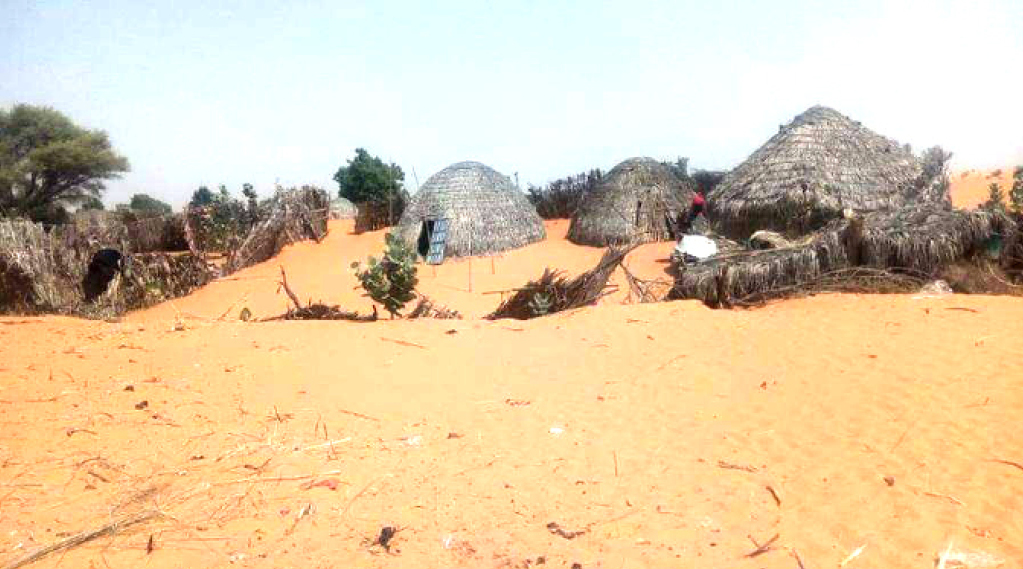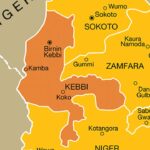Sand dunes have continued to wreak havoc on people in Yobe State, affecting their livelihoods and displacing them from their homes, especially in Yunusari, Yusufari and Karasuwa local government areas of the state.
Daily Trust has gathered that the sand dunes have covered farmlands and houses in some villages, rendering many people homeless while leaving many others in abject poverty as a result of sandstorms that have continually ravaged farmlands and killed livestock.
Left homeless and without sources of livelihood, the people living in the northern fringes of Yobe State are now migrating southward.
Tela Isa, a resident of Dangwaji village, said sand dunes have destroyed houses and farmlands in his village, which forced many people to lose their livelihoods. He said they also affect their irrigation farming dam and borehole.
- FG receives 104 stranded Nigerians from Chad
- Nigeria now a laughing stock over outcome of presidential poll – Atiku campaign
‘‘The desert encroachment has swallowed half of our river, which we relied on for irrigation farming, source of drinking water for animals; and also destroyed our boreholes and houses as well. In fact, as a health worker, I can confirm to you that these dunes have reached our hospital,’’ he said.
The ‘‘Southern part of this town finds it difficult to reach water when they are drilling boreholes because the land has been covered by sand dunes,’’ he added.
“You cannot sow millet in our village anymore,” said a farmer, Umar Samaila Tulo-Tulo, who lost his farmlands to the encroaching desertification.
He said sandstorms in the area have wrecked houses, grazing areas, irrigation farms, feeder roads, and other buildings in the town.
‘‘We are situated in an environment that is encroached upon by desert. We are losing our livelihoods every day, most of our farmlands have been destroyed, and so many people have lost their homes because sand dunes have occupied many houses and the problem is still persisting,’’ he added.
‘‘Yobe is an agrarian state, 99 per cent of Tulo-Tulo residents are farmers but I can tell you that must of us have lost our livelihoods because we cannot sow millet in our farms. If you do, dunes will occupy the farmland before your crops grow. Sand always easily spread across the state,’’ he added.
According to him, the North East Arid Zone Development Programme (NEAZDP) has promised to address the problem through a holistic approach of tree planting and economic empowerment to women and the teeming youth of the town.
Zanna Wakil Gana, the village head of Tulo-Tulo, said northern Yobe, specifically Yusufari local government is the most affected where the residents of Kaska, Lalla, Dangwaji, Kirtawa and Tulo-Tulo are battling with sand dunes to survive in their towns.
He said people are building their houses in dunes because the land has been taken over by the dunes.
The village head said commercial drivers have increased fares to transport foodstuff to the village compared with other villages because they find it difficult to drive over the dunes and arrive in less than four hours.
‘‘Tulo-Tulo is the most populated town in Yusufari local government, but I can assure you that only three boreholes are working now, others have been clogged by the dunes. Not only that, our youth are building their houses in dunes because the land is no longer there.
‘‘And commercial drivers are extorting our businessmen who transport our food because they spend four hours driving over the dunes before they arrive here,’’ he added.
‘‘Also, our people are migrating from this town to other places because the farmlands and houses are destroyed by sand dunes.
“The sandstorms have also destroyed the economic activities of most of the affected communities as they find it difficult to sell their foodstuff which they manage to cultivate,” he added.
Perhaps this natural disaster has made Tulo-Tulo town to become an attraction as tourist centres, visitors and students from higher institutions across the country are visiting the town to take pictures of the devastation.
Located in a low valley and surrounded by palm trees between five hills, Tulo-Tulo settlement is located near an oasis on the Desert Island and about 105km north of Nguru at the desert fringes bordering the Republic of Niger.
The village has another oasis with a reddish, undulating landscape, giving it magnificent, picturesque scenery.
Tulo-Tulo is endowed with fertile soil and rich mineral resources. Potash, which is also known as black salt, is available in commercial quantities.
Dr Mohammed Bukar NGamdu, an environmentalist, said desert encroachment has destroyed livelihoods and taken over the houses of Yobe North people, who solely depend on agriculture for sustenance.
He said, “As a result of continuous degradation of the environment it leads to clashes between farmers and herders; it leads to other such violence; it leads to migration, people do migrate from the northern part of the country toward the south because the lands they depend on have been taken over by the desert,’’ he said.
‘‘As you have seen in the northern part of Yobe State, specifically places like Tulo-Tulo, you will cover a distance of 10 to 15 kilometers without seeing a single tree; where have the trees gone to? Initially these were areas that had flourishing vegetation, but as a result of human activities, mostly the cutting down of trees, the land is now bare.’’
Dr NGamdu further said, ‘‘An idle mind is a devil’s workshop. That is why some people who lost their livelihoods as a result of climate change and land degradation can easily be indoctrinated, can easily be convinced with a little amount.’’
Meanwhile, when contacted, Alhaji Ahmed Muhammad Abubakar, the Director, Drought Desertification and Climate Change, Yobe State Ministry of Environment, said the state government has tried to confront the problem headlong by establishing the Yobe State Climate Change Action Plan in 2021.
‘‘A lot of communities are seriously threatened. Farmlands have been degraded, and communities have been shifting southward for fear of being covered by the advancing sand dunes. So it is a serious problem, it has affected many communities, and farm production, which threatens our food security.
“It has led to serious issues of poverty among communities living in these areas. So it’s a serious problem affecting our people in the state (desertification and ever-increasing sand dunes). If care is not taken, these sand dunes will be moving into the hinterland of the country.’’
He, however, said the Yobe State government is producing a lot of seedlings for tree planting in order to control the advancing sand dunes.
He said the most effective way to deal with the menace of the sand dunes is to establish shelterbelts.
“Shelterbelts serve as a screen to the advancing sand, so that whenever the northeast trade wind blows the sand particles, the shelterbelts will serve as shield, and the sand particles are deposited behind the shelterbelts,” he added.
He said the state government produced five million seedlings in 2021 and three million seedlings last year.
“Apart from that, the present administration has been trying to confront the problem headlong by establishing what we call the ‘Yobe State Climate Change Action Plan’. The state governor launched the programme last two years in Damaturu, the state capital,’’ he said.
‘‘Those five million seedlings I told you earlier were distributed to communities, and the government also established 300 hectares of gum Arabic plantation in three senatorial zones in the state in order to checkmate the menace of advancing sand dunes,’’ he added.
Experts said the disaster affects the northern parts of Borno, Yobe, Adamawa, Bauchi, Sokoto, Gombe, Jigawa, Kano, Sokoto, Kebbi and Zamfara states.
According to them, the disaster requires a holistic approach to tackle it, and is exacerbated by climate change.
The Yobe State government said proximity to the Sahara Desert is one of the factors compounding the problem, as the state shares the largest boundaries with Niger Republic; about 325km.




